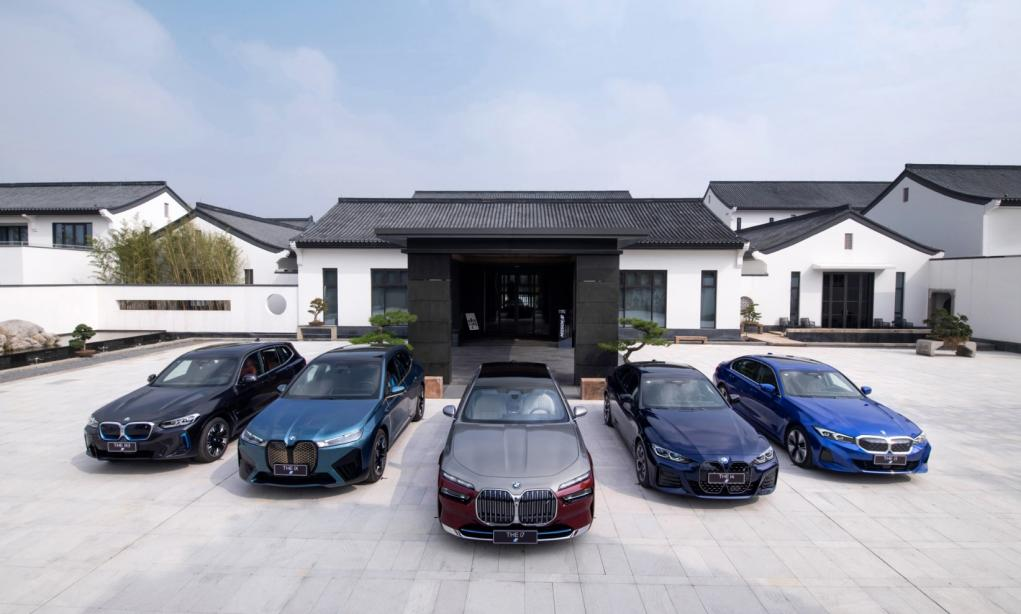BMW plans to launch 11 new pure electric vehicles in China by 2023, including domestically produced BMWiX1, Rolls-Royce SPECTRE, and BMW Motorrad CE04. In addition, the pure electric MINI three-door version will continue to be available in Hong Kong, Macau, and Taiwan markets.
Five pure electric vehicle models, including the new BMW i3, innovative BMW i4, innovative BMW i7, new BMW iX3, innovative BMW iX, have been unveiled by the BMW Group in China.
BMW’s new energy path
On November 11th, the new BMW Power Battery Project signing ceremony was held in Shenyang, where the project cost CNY 100 billion ($15.6 billion) and is invested by BMW Brilliance Automotive. The CEO of BMW Brilliance Automotive, Dai Hexuan, said that the investment is intended to expand the production scale of power batteries at the Shenyang plant. This is a crucial step for BMW to accelerate electrification in China, following another significant investment following the large-scale upgrading project of the BMW Brilliance plant (total investment of CNY 15 billion ($2.3 billion)). The local production capacity and scale of BMW’s power batteries will be greatly increased, further promoting BMW’s latest technology implementation in China.
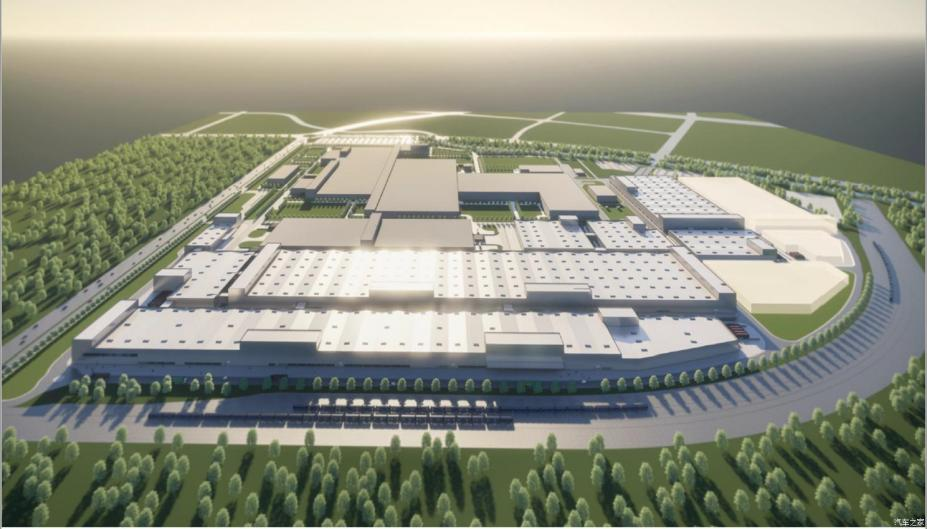
The project is located in the China-Germany (Shenyang) High-End Equipment Manufacturing Industrial Park in the Shenyang Economic & Technological Development Zone. This will become the BMW Group’s third power battery center globally. BMW Brilliance plans to increase its annual capacity to 650,000 vehicles in 3-5 years. Meanwhile, BMW Group Chairman Oliver Zipse also said that China will remain one of BMW Group’s most strategic markets.
In October 2018, BMW Group held a Chinese strategic agreement signing ceremony and the TaiXi new factory groundbreaking ceremony with BMW Brilliance Automotive. At the same time, the group added EUR 3 billion ($3.5 billion) of investment to BMW Brilliance Automotive for future projects related to the renovation of the Shenyang production base.
BMW transformation progress overview chart:
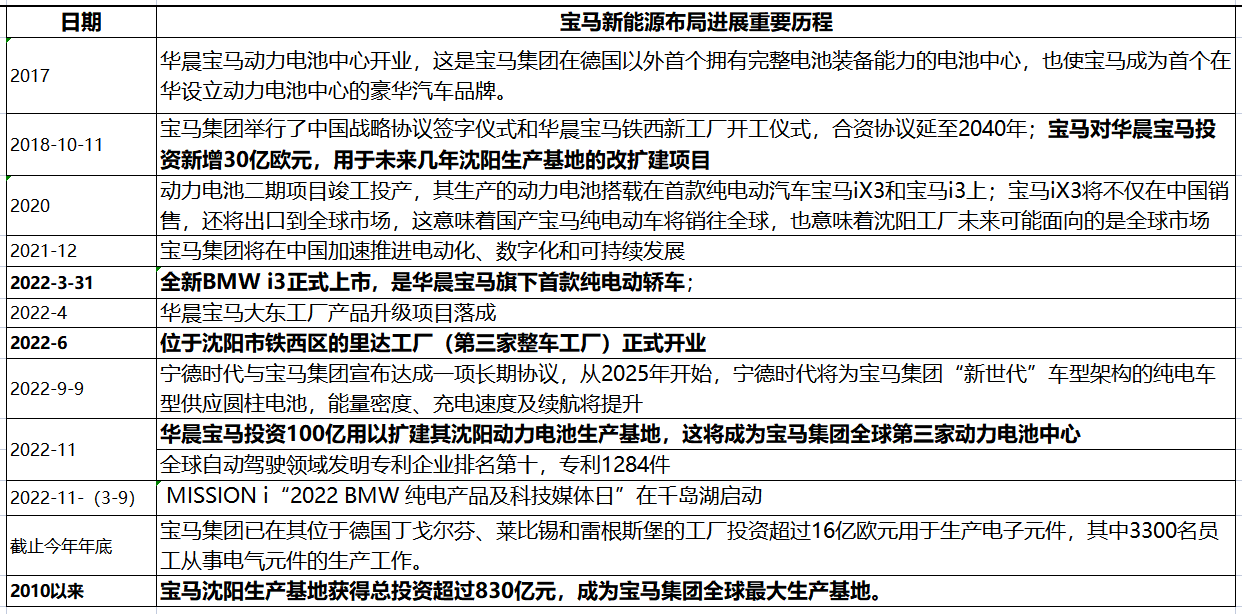 “`markdown
“`markdown
In November 2022, BMW officially announced that its new model iX1 had rolled off the production line at its Regensburg factory in Germany and launched in Australia, marking another step forward in BMW’s electrification strategy. The model will also be localized in China and become the entry-level pure electric SUV of BMW in China in 2023.
From November 3 to 9, 2022, the MISSION i “2022 BMW Pure Electric Product and Technology Media Day” was launched in Qiandao Lake, China, where 5 pure electric BMW models, namely the new BMW i3, innovative BMW i4, innovative BMW i7, new BMW iX3 and innovative BMW iX, made their debut in China for the first time. In addition, the brand-new pure electric BMW CE 04 motorcycle also appeared on the same stage.
In fact, these 5 models are derived from the 3 Series, 4 Series, 7 Series, X3 Series and X Series fuel car models respectively, namely, “Oil-to-Electric” models.
It is worth mentioning that all 5 models are equipped with the fifth-generation BMW eDrive electric drive system, and all the core components of BMW’s power and drive system are independently researched and developed and manufactured by BMW. In China, BMW factories have a relatively complete supply chain system. In the future, some models may be priced lower than overseas.
In recent years, the overview of BMW’s transformation into electric cars is as follows:
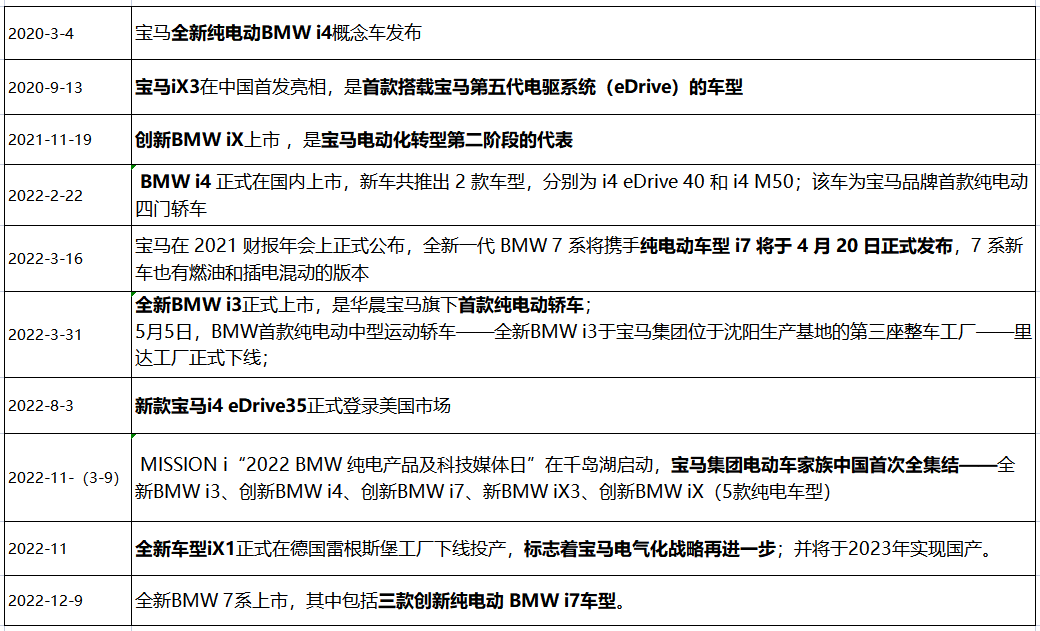
BMW’s new energy transformation performs poorly
Recently, the China Passenger Car Association (CPCA) released a set of retail data for domestic car manufacturers, among which BMW Brilliance Auto Ltd., ranked No. 12, sold 52,865 cars in November, up 7.2% YoY, but its sales in January-November period amounted to 594,475, down 2.9% YoY, ranking it 14th in terms of sales volume among domestic car manufacturers. However, BMW’s new energy vehicles did not appear on the list of new energy vehicle sales.
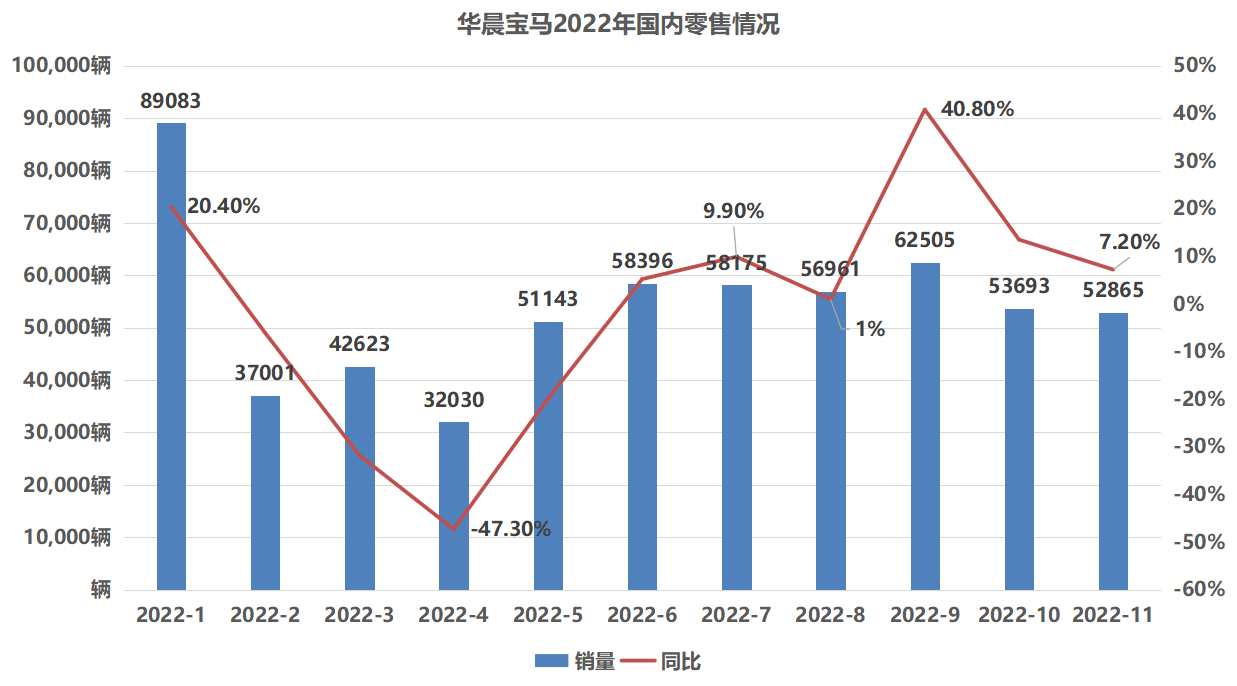
“`
From the data, BMW’s sales volume has dropped significantly in the first half of this year, although it has continued to rise in the second half, overall, BMW’s sales volume this year will slightly lower. However, looking at the sales volume of various models under BMW, its new energy vehicles have a good growth rate in sales volume, but the absolute proportion is still limited.
According to the financial report, BMW’s domestic sales volume accounted for 33.6% of the total sales volume in 2021, which is also the market with the largest proportion of BMW Group’s automobile sales, among which the sales volume of new energy vehicles in China exceeded 48,000 units, a YoY increase of 69.6%. Since 2014, nearly 140,000 new energy vehicles have been delivered in China. Among them, the pure electric BMW iX3 achieved a sales volume of over 21,000 units in its first full year of sales.
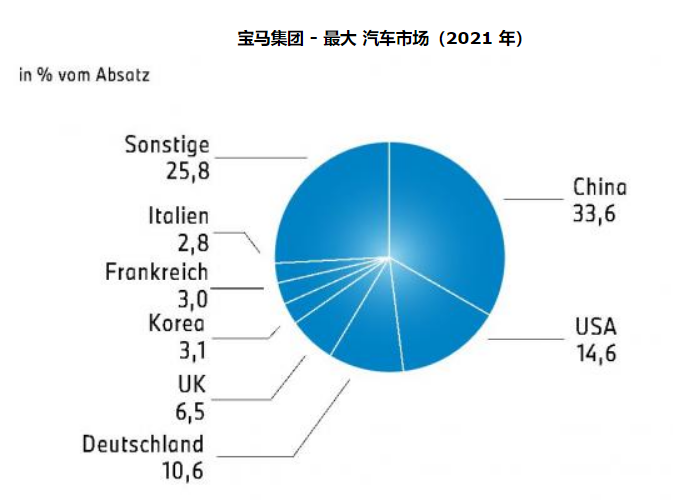
In addition, BMW’s new energy vehicles (including pure electric vehicles and plug-in hybrid vehicles) accounted for 13% of the global sales volume, with a sales volume of 3,283,140 units, a YoY increase of 70.4%. Among them, the global sales volume of pure electric vehicles was 103,854 units, a YoY increase of 133.2%; the sales of plug-in hybrid vehicles was 224,460 units, a YoY increase of 51.5%.
Earlier, Nicolas Peter, Chief Financial Officer of BMW Group, said that the company expects to achieve a sales volume of pure electric vehicles accounting for 10% of the total sales volume, about 240,000 units, in 2022, which will rise to 400,000 units in 2023. This means that they need to break the previous year’s sales volume by about twice in 2022 and 2023 to achieve the target.

In the recent three quarters, BMW’s pure electric vehicles have maintained a high growth momentum.
Data shows that in the recent three quarters, the total sales volume of BMW’s pure electric vehicles in China has increased by 65% year on year. The global delivery of pure electric vehicles was about 128,000 units, a YoY increase of 114.8%. To achieve the annual sales target, BMW Group needs to complete a delivery task of about 112,000 pure electric vehicles in the fourth quarter, which means its sales volume in the fourth quarter must increase by 158% year on year. However, this number has exceeded the actual sales volume of the whole year last year. Although the growth rate of sales volume of pure electric vehicles has been particularly impressive recently, it is almost impossible to complete such a tough task.## Pushing new models and taking big strides in transformation
On December 9, BMW Group announced that the BMW 7 Series family officially went on sale including three pure electric models. The financial report shows that in 2021, BMW i-series models (iX, i3, i8) sold 31,179 cars, a year-on-year increase of 10.7%, accounting for 1.4% of BMW’s annual delivery share. The launch of new products may increase the sales share of new energy vehicles by the end of the year.
The official prices of the three pure electric models are as follows:

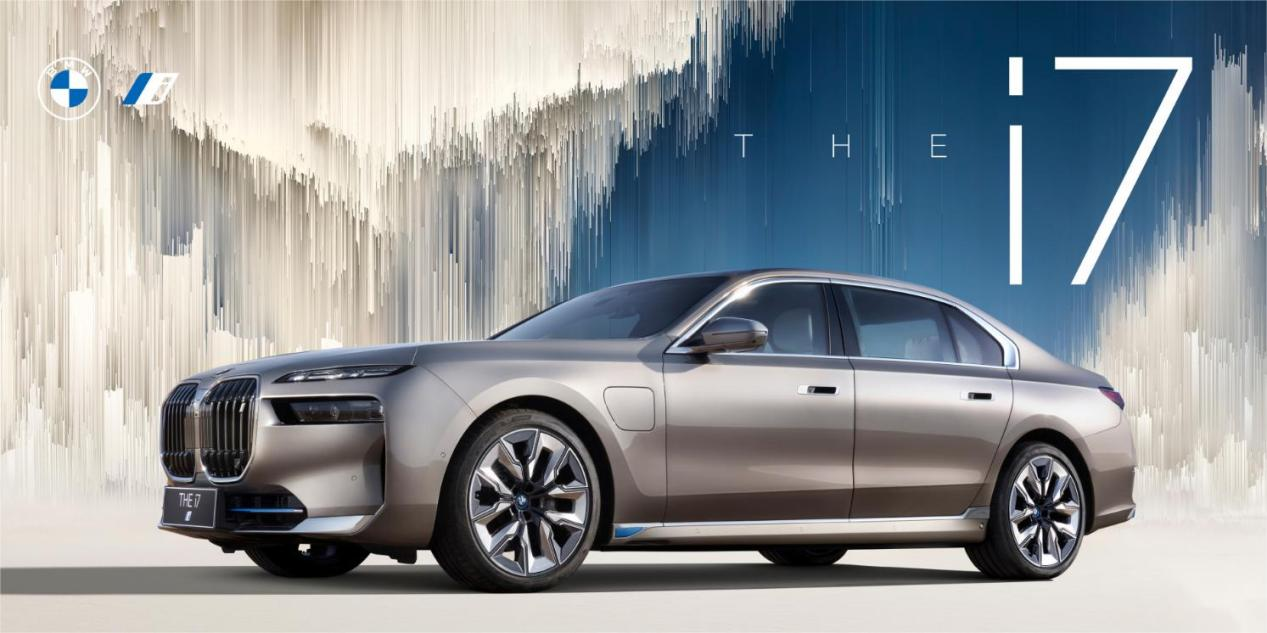
In addition, BMW Group plans to ensure that at least one-third of the cars produced by the Bavarian (Germany) factory are electric vehicles by 2024.
“BMW Group’s President in China, Mr. Shao Bin, said that all brands under BMW Group are accelerating their electrification transformation, including BMW, MINI, Rolls-Royce and BMW Motorrad, and will move towards comprehensive electrification in the future.”
BMW Group expects global delivery of pure electric vehicles to account for 30% of total share by 2025, which is about 2 million vehicles delivered. In the same year, BMW’s “new generation” models will be launched, which means that BMW needs to transition from “oil-to-electricity” to true pure electric vehicles, and will take another two years. By 2030, the global delivery of pure electric vehicles by BMW Group should account for 50% of its total share, and cumulative sales of pure electric vehicles are expected to reach 10 million.
Global sales data shows that the Chinese market occupies an important position for the BMW Group. In the future, BMW Group will also build the largest research and development verification system outside of Germany in China. Obviously, BMW’s transformation road requires significant financial, material, and technological investment, and planning for the future is also arduous.
This article is a translation by ChatGPT of a Chinese report from 42HOW. If you have any questions about it, please email bd@42how.com.
